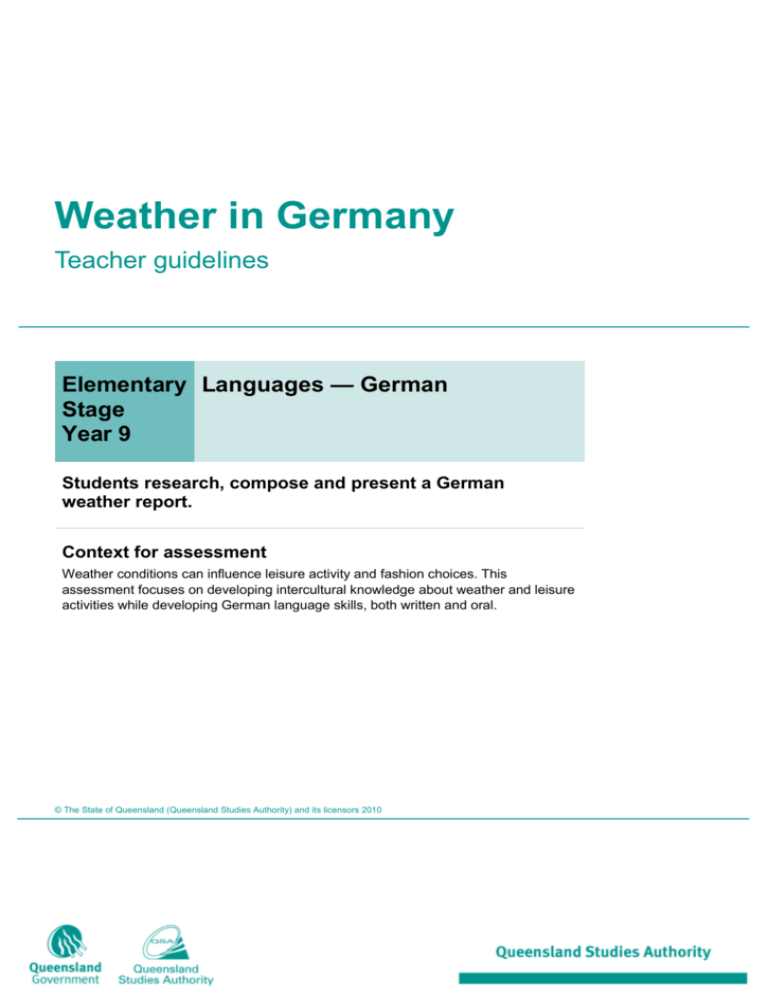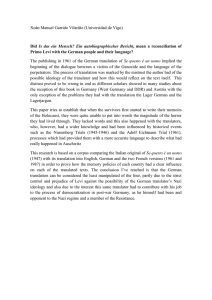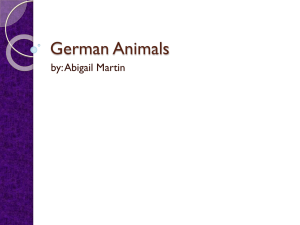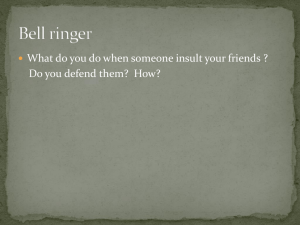Year 9 Languages assessment teacher guidelines | Weather in
advertisement

Weather in Germany Teacher guidelines Elementary Languages — German Stage Year 9 Students research, compose and present a German weather report. Context for assessment Weather conditions can influence leisure activity and fashion choices. This assessment focuses on developing intercultural knowledge about weather and leisure activities while developing German language skills, both written and oral. © The State of Queensland (Queensland Studies Authority) and its licensors 2010 This assessment gathers evidence of learning for the following Essential Learnings: Languages Essential Learnings by the end of Elementary Stage Assessable elements Ways of working Composing texts Students are able to: recognise and use appropriate verbal and non-verbal language to support the development of communicative competence construct simple, cohesive spoken and written texts for different contexts, displaying some concept of register Intercultural competence notice and compare their own beliefs, attitudes and practices and those reflected in the target culture. Knowledge and understanding Knowledge and understanding Comprehending and composing in the target language Comprehending and composing skills are used to understand language input, to convey information and express ideas and opinions, and to engage in interactions in the target language for different purposes, contexts and audiences. Verbal language and non-verbal language are adapted according to purpose, context and audience. Texts, including conversations and narratives, follow patterns and are shaped by conventions that can vary between cultures. Familiar language can be used in new contexts to help interpret and convey main ideas and supporting details. Familiar linguistic features and structures are manipulated to generate original target language texts and to construct simple, cohesive texts for different purposes, contexts and audiences. Intercultural competence and language awareness Intercultural competence and knowledge of languages and cultures allow for exploration of different ways of experiencing and acting in the world. Cultural practices in the target language can be compared with those of other cultures and connections noticed between language use and cultural knowledge and behaviour. Investigations into language use and cultural beliefs, attitudes and practices further develop intercultural competence. Source: Queensland Studies Authority 2007, Languages Essential Learnings by the end of the Elementary stage, QSA, Brisbane. 2 | Teacher guidelines Elementary Stage Year 9 Languages — German: Weather in Germany Listed here are suggested learning experiences for students before implementing this assessment. Revise any key text structures and language elements targeted for assessment (see Appendix A: Suggested linguistic features and structures). Write original sentences using new grammar and vocabulary, and repeat them aloud. Imitate native speakers or other proficient users — friends, teachers. Learn set pieces well — practise in front of a mirror or record on tape. Read German magazines to increase knowledge of vocabulary and grammar. Research weather patterns and leisure activities in Germany using the internet. Use photos of different cities and weather conditions in Germany to stimulate discussion about weather patterns and how it could affect leisure choices (see Appendix B: Cities in Germany). Research activities that can be carried out in different weather conditions — what activities are best if the weather is cold, rainy, hot or snowing? Discuss the genre of a weather report. Watch DVDs of weather reports from Germany, focusing on: how the weather differs throughout the country the different stages of a weather report the different kinds of weather conditions reported. Create an English–German glossary of weather terminology. Examine and discuss clothing choices that are made according to weather conditions. Interview a German exchange student to learn about the weather in Germany. With a partner, comment on and ask questions about the weather in German. Write about the weather in Australia and make comparisons with the weather in Germany. Participate in German-language roleplays related to weather. Create slide shows related to the weather. Queensland Studies Authority | 3 Ensure that all students have access to learning experiences. Consider the following Inclusive strategies and make any required adjustments to teaching and learning to meet specific individual learning needs. Inclusive strategies Inclusive strategies enable a learner with disabilities to participate in learning experiences on the same basis as a learner without disabilities. This is achieved by making adjustments to the delivery or mode of assessment, without changing the way the assessment is judged or marked. A teacher makes required adjustments to teaching, learning and assessment to enable a student with disabilities to demonstrate knowledge, skills or competencies (Disability Discrimination Act 1992 and Disability Standards for Education 2005 Cwlth). Adjustments made to teaching, learning and assessment should not impact on judgments made about student achievement. Adjustments to teaching, learning and assessment can be grouped into five broad areas: 1. Timing: the amount of time allocated 2. Scheduling: when assessment occurs 3. Setting: where assessment is completed 4. Presentation: how an assessment appears or is communicated to a student 5. Response: how a student responds to the assessment. Note: More than one inclusive strategy can be used. Teacher resources To the best of our knowledge, the websites listed below contain no controversial materials or links. However, teachers are advised to check the websites themselves before recommending them to students. All websites listed below were accessed 22 June 2010. The following websites feature aspects of German weather and climate: About Germany.org, “Weather and Climate in Germany”, <www.about-germany.org/life/weather-in-germany.php>. Climate and temperature, “Germany”, <www.climatetemp.info/germany>. Germany-map.org, “The weather in Germany”, <www.germany-map.org/germany-weather.htm>. The Weather Channel, “Almanac: Daily Observations for Berlin, Germany”, <uk.weather.com/weather/almanac-Berlin-GMXX0007>. The Weather Forecast, “Germany”, <www.theweatherforecast.info/index.php?pagina=Germany>. Weather Underground, “Germany”, <www.wunderground.com/global/DL.html>. The following websites feature videos about German weather: 4 Google videos, “German weather report”, <video.google.com.au/videoplay?docid=1725141883468492199&ei=R5YMS_WbEIGYwgPtt-xY&hl=en#>. YouTube, “My German weather report”, <www.youtube.com/watch?v=GMl34TUnQrw>. YouTube, “Learn German - German Weather Vocabulary”, <www.youtube.com/watch?v=Ix6cy990vuI&feature=related>. | Teacher guidelines Elementary Stage Year 9 Languages — German: Weather in Germany Preparing Consider these points before implementing the assessment. Decide how you will schedule the assessment. There are two sections to this assessment. Section 1 is a research phase, Section 2 involves writing and an oral presentation. These could be carried out over a three-week period or a term of work. Make sure that students have an opportunity to get feedback at the end of each section. Decide whether you will record weather report presentations. Recordings could be useful during assessment and when giving feedback. Resources for the assessment Appendix A Suggested linguistic features and structures Appendix B Cities in Germany Implementing Book the library for three sessions (or longer) to complete investigation. Teach or revise any key text structures and language elements targeted for assessment (see Appendix A). The time allocated to this is variable. Arrange access to library, computers, rehearsal areas, digital cameras, web-page software resources if required by students who don’t have access to computers at home. Employ the support strategies used in everyday practice for students who may require additional support to complete the assessment. Queensland Studies Authority | 5 Using the Guide to making judgments (GTMJ) 6 | Teacher guidelines Elementary Stage Year 9 Languages — German: Weather in Germany Making judgments about this assessment In this assessment teachers have been asked to make A to E judgments around the identified Assessable elements. Where to find the evidence Demonstrated in Section 1 of the Student booklet. Demonstrated in Section 2 of the Student booklet. Look for evidence of: Look for evidence of: identifying and comparing weather and leisure activities in Germany making connections between weather and leisure activities. using oral presentation skills (pronunciation, intonation and rhythm) using accuracy and a variety of German grammar. Assessing intercultural competence Assessment of intercultural competence does not require assessment of the target language, and therefore students can demonstrate this competency in English. Consider also any evidence in target-language texts composed or presented by the student when making a final judgment of this assessable element. Evaluate the information gathered from the assessment to inform teaching and learning strategies. Involve students in the feedback process. Give students opportunities to ask follow-up questions and share their learning observations or experiences. Focus feedback on the student’s personal progress. Emphasise continuous progress relative to their previous achievement and to the learning expectations — avoid comparing a student with their classmates. More information about providing feedback to students is contained in a series of professional development packages entitled Assessment for learning, available in the resources section of the Assessment Bank. See <www.qsa.qld.edu.au> Prep–Year 9 > Assessment Bank. Queensland Studies Authority | 7 Appendix A Suggested linguistic features and structures Please also refer to the Indicative A response. Language elements German Questions using future tense Wie wird das Wetter morgen/am … tag? Questions using past tense Wie war das Wetter? Questions using question words Wann, wo, was Present perfect tense z.B. Wir sind geschwommen Coordinating conjunctions Denn, aber, oder, sondern Subordinating conjunctions Word order using: obwohl, dass, weil, wenn Modals Sollen, können, dürfen Use of polite language Sie Adjectives and adjective endings Kalt, heiss, warm, frisch, (en, e, es, er), nebelig Comparative and superlative adjectives Besser, am besten; lieber, am liebsten Seasons Winter, Sommer, Frühling, Herbst Days of the week Montag, Dienstag, Mittwoch Months Januar, Mai, Juni Numbers, including degrees, dates Vier, sieben, halb, vierzehnte Adverbs of time Am Wochenende, morgen, morgens, heute, nächste Woche Clothing Regenmantel, Regenschirm, Pullis Activities/verbs schwimmen, radfahren Year 9 Elementary stage Languages — German: Weather in Germany Queensland Studies Authority (Image source: Hofgarten in Munich in the snow, a Creative Commons: Attribution 2.0 Generic licensed photo from heatheronhertravels's Flickr stream, accessed 7 May 2010.) Kölner Dom. Cologne (Image source: Neus Rathaus and Munich Frauenkirche from the top of Peterskirche, a Creative Commons: Attribution 2.0 Generic licensed photo from paul-simpson.org's Flickr stream, accessed 7 May 2010. Appendix B Cities in Germany Munich Cologne Munich Year 9 Elementary stage Languages — German: Weather in Germany Queensland Studies Authority







